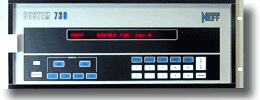|
System
730
Features:
- Phase Shift Between Channels:Less than 1 deg; on low and
medium ranges
- Ripple in the Passband: Less than 0.005dB
- Signal Bandwidth: to 14khz
- Bandwidth/Sample Rate Selections: 108
- Programmable combinations
- Throughput Rate: 2M Samples per Second
- Full Scale Ranges:+/- 5mV to +/- 10.24V
- Overall Accuracy:+/- (0.02% FS + 2uV)
- Channel Capacity: To 512 channels
- Calibration: Automatic with built-in calibration supply
- Transducer Conditioning: Built in
- Transducer Configuration: Identifiable with 8-bit code
- Input Coupling : AC or DC, Programmable
|

A new standard in acquisition
of dynamic signals
A complete system for signal
bandwidths from DC to 14KHz
Click
here for System 730
Function Cards
|
The System 730 represents a new standard in acquisition of dynamic
signals by minimizing errors caused by noise, skew and phase shift.
If your testing environment requires correlation of data between
channels, you need the System 730. Accuracy and reliability have
always been the watchwords at NEFF. Now Continuous acquisition of
dynamic data can be performed with the same confidence that has
been instilled in the users of NEFF's products over the last 40
years. It is no longer necessary to pre-record data for later conversion
and analysis; it is now possible to acquire and analyze data in
real time. Advances in ADC and digital filter technology combine
to provide an alternative to expensive and bulky analog filter solutions
for signal conditioning.
System 730 eliminates the errors caused by phase shift and skew
between channels while maintaining state-of-the-art accuracies of
+/- (0.02% FS + 2uV).
Quality data acquisition systems include multi-pole filters to
attenuate noise and prevent aliasing but skew and phase shift differences
between channels can cause errors that eclipse the magnitude of
all others. System 730 employs an analog filter to prevent aliasing
but in addition is designed with digital filters to reduce noise
and minimize data sampling rate.
The characteristic rolloff rate of the digital filter design is
so steep, greater than 290dB per octave, that it permits the sampling
rate to be only 2.67 times the frequency of the filter cutoff frequency.
The result is a reduced load on the interface bus and less data
storage capacity.
Each channel includes configuration-coded transducer conditioning,
voltage and shunt calibration, high frequency common-mode voltage
protection, programmable gain, programmable filters, and a 16-bit
ADC.
|

